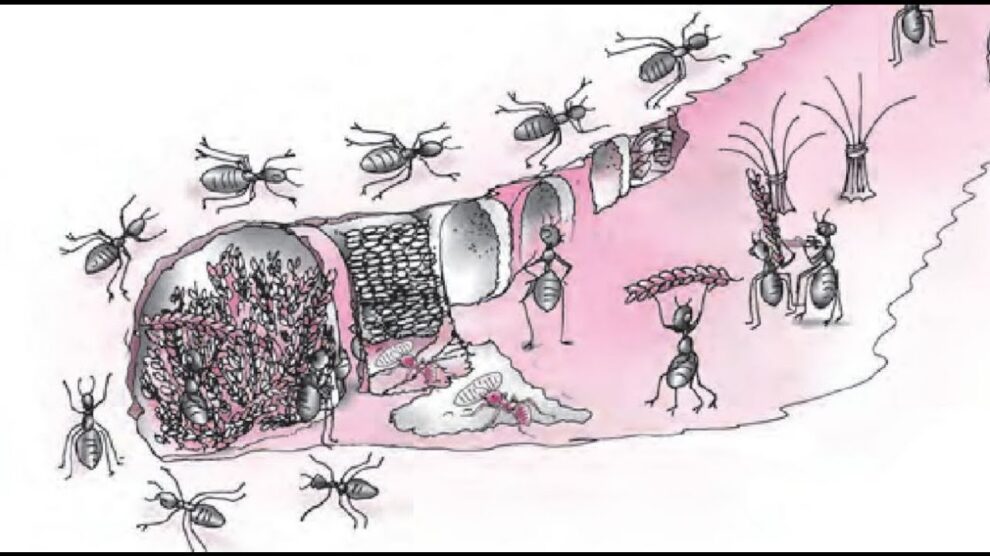NAME the smallest insect you have seen, and the wisest. Is it the fly? No, it isn’t. Is it the mosquito? No, not the mosquito. Then it must be the worm. No, none of these. It is the ant—the commonest, the smallest but the wisest insect. The story of an ant’s life sounds almost untrue. But people have kept ants as pets, and have watched their daily behaviour closely. So we know a number of facts about this tiny, hard-working and intelligent creature.

An ant uses its feelers or antennae to ‘talk’ to other ants by passing messages through them. Watch a row of ants moving up or down the wall. Each ant greets all the others coming from the opposite direction by touching their feelers.
There are many kinds of ants. The commonest among them are the black or red ones. We have seen them since we were children, but haven’t paid enough attention to them. Where do they live? In their comfortable homes called ‘nests’ or ‘anthills’. Each has hundreds of little rooms and passages. In some of these rooms the queen ant lays eggs. Others are nurseries for the young ones (called ‘grubs’). Workers have their reserved quarters. They spend most of their time searching for food. Some rooms serve as storehouses for this food. Soldiers have separate barracks. No worker has ever tried to live in a soldier’s house; no soldier has ever gone out searching for food. No worker or soldier or cleaner has ever harmed a grub. So you see, an ant’s life is very peaceful. Each does its share of work intelligently and bravely, and never fights with other members of the group.
The queen is the mother of the entire population of the colony. It lives for about fifteen years. It has a pair of wings but bites them off after its ‘wedding’ flight. This flight takes place on a hot summer day. The queen leaves the nest and goes out to meet a male ant, or drone, high up in the air. On its return to earth, it gets rid of its wings and then does nothing but lay eggs.
Eggs hatch and grubs come out. Soldiers guard them. Workers feed and clean them, and also carry them about daily for airing, exercise and sunshine. Two or three weeks later, grubs become cocoons and lie without food or activity for three weeks more. Then the cocoons break and perfect ants appear. Now it’s time for teaching and training. New ants learn their duties from old ants as workers, soldiers, builders, cleaners, etc. After a few weeks’ training, the small ants are ready to go out into the big world of work.
An anthill is a home not only for ants but also for some other creatures—beetles, lesser breeds of ants and the greenfly. Why do ants want these alien creatures to live in their nests? For several reasons: some give off smell pleasant to the ants’ senses others give sweet juices; and some are just pets or playthings like cats and dogs to human beings. The greenfly is the ants’ cow. The ants train it to give honeydew (like milk) with a touch of their antennae. They milk it just as we milk the cow.
Have humans learned as much as ants have? Perhaps they have, but they haven’t put their learning to good use. They may still learn a few things from this tiny teacher— hard work, sense of duty and discipline, cleanliness, care for the young ones, and, above all, a firm loyalty to the land where they live.
No comments:
Post a Comment